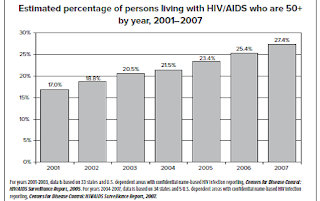 Well, signs and symptoms of HIV in older
adults can, in fact, be similar to that of younger adults in the early stages of infection. However, when we add in common complications that
occur with aging as well as a variety of chronic illnesses that can come with
age, it’s not always so easy to distinguish between HIV and other
problems. Unfortunately, HIV is usually
the last thing that is addressed in older adults or, in many cases, missed
completely.
Well, signs and symptoms of HIV in older
adults can, in fact, be similar to that of younger adults in the early stages of infection. However, when we add in common complications that
occur with aging as well as a variety of chronic illnesses that can come with
age, it’s not always so easy to distinguish between HIV and other
problems. Unfortunately, HIV is usually
the last thing that is addressed in older adults or, in many cases, missed
completely.
Many people have no symptoms when they
first become infected with HIV. It can take as little as a few weeks for minor,
flu-like symptoms to show up, or more than 10 years for more serious symptoms
to appear. Signs of HIV can include headache, cough, diarrhea, swollen glands,
lack of energy, loss of appetite, weight loss, fevers and sweats, repeated
yeast infections, skin rashes, pelvic and abdominal cramps, sores in the mouth
or on certain parts of the body, and short-term memory loss. In the table below from Smith et al., you can see the frequency that one might see of the most common signs and symptoms.
Many HIV symptoms in older adults can resemble
symptoms associated with a number of other illnesses that are commonly seen in
the population. Most commonly, these include
fatigue, flu-like symptoms, respiratory problems, weight loss, chronic pain,
night sweats, skin rashes, swollen lymph nodes, and neurological problems.
In addition, as the disease progresses, the effects
of HIV may have a much greater impact on the aging adult. According to Stoff et al. as found on the UNC
website listed below, “Compelling evidence exists that natural history and
symptom manifestations of HIV infection in the elderly substantially differ
from those seen in younger cohorts. Relative to their younger counterparts, older
adults living with HIV/AIDS have a more severe HIV disease course and a shorter
survival rate; have less desirable health indices at diagnosis (e.g., lower
CD4+ cell counts); have shorter AIDS-free intervals; have a higher number of
opportunistic infections; and have earlier development of tumors and lesions.”
I think the take home message here is: while it may appear on the surface that everyone's response to HIV infection is the same, there may actually be much more we aren't seeing. Of course, everyone is different and reacts differently but, with older adults, there can be many other things going on that can steer us away from HIV infection. All in all: remember to look outside the box! :D
I think the take home message here is: while it may appear on the surface that everyone's response to HIV infection is the same, there may actually be much more we aren't seeing. Of course, everyone is different and reacts differently but, with older adults, there can be many other things going on that can steer us away from HIV infection. All in all: remember to look outside the box! :D
Fitzpatrick,
L. K. (2011). Routine HIV testing in older adults. American Medical Association Journal of Ethics, 13(2), 109-12.
Retrieved from http://virtualmentor.ama-assn.org/2011/02/cprl1-1102.html
Smith,
D. K., Grohskopf, L. A., Black, R. J., Auerbach, J. D., Veronese, F., Struble,
K. A., Cheever, L., & Onorato, I. M. (2005, January 21). Antiretroviral
postexposure prophylaxis after sexual, injection-drug use, or other nonoccupational
exposure to hiv in the united states. Retrieved from http://www.thebody.com/content/art17171.html
The citation below is a great resource for medical matters! They cover issues related to HIV in older
adults in a variety of systems and disease states including the immune system,
heart and blood vessels, high cholesterol and triglycerides, body weight,
diabetes, the senses, the nervous system and mental health, bones, urinary
system, liver, kidneys, skin, and cancer.
Ernst,
J., Hufnagle, J., Karpiak, S., & Shippy, A. (2008). HIV and older adults. AIDS Community Research Initiative of
America (ACRIA). [booklet]. Retrieved from http://www.acria.org/files/hiv-older-adults.pdf
Very cool website from the University of North
Carolina. The learning module walks you through
aging and HIV; worth taking the time to work your way through. http://www.med.unc.edu/aging/elderhiv/welcome.htm








